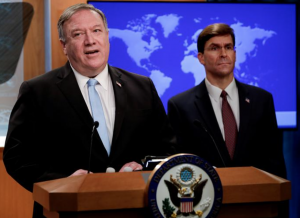By: Andreas Munguia
Journal of Global Rights and Organizations, Associate Articles Editor
NEW YORK, United States – On November 4, 2021, a federal judge in the Southern District of New York granted a preliminary injunction blocking an executive order issued by the Trump Administration in June of last year, which threatened to impose sanctions on the International Criminal Court’s (ICC) officials and “any foreign person” assisting ongoing investigations by the court into suspected human rights abuses and other crimes by U.S. military personnel in Afghanistan between 2003 and 2014. The ICC, which holds jurisdiction over investigations and prosecutions of individuals accused of war crimes, called the Trump Administration’s move an attack on international criminal justice and referred to it as an attempt to interfere with the court’s independence and its responsibility to investigate suspected war crimes. The European Union had also expressed its opposition to the move.

Four dual-national U.S. international law professors and the Open Society Justice Initiative, a human rights organization based in New York, challenged the executive order on the ground that it was a violation of their First Amendment right to free speech. The plaintiffs – both of whom often interact with the ICC and the Office of the Prosecutor through, for example, trainings, advice, or amicus briefs – were concerned that their interactions with the court would potentially be considered “prohibited transactions” with ICC Prosecutor Fatou Bensouda and Phakiso Mochochoko, a senior member of the prosecutor’s office. If these interactions were in fact considered “prohibited transactions” with Bensouda and Mochochoko, both of whom faced sanctions under the executive order, the plaintiffs would be subject to prosecution. In addition, because the executive order allows for sanctions to be imposed on “entities that have materially assisted designated persons,” the plaintiffs were also concerned that they would face sanctions themselves.
The district court granted the preliminary injunction on the ground that there was a high likelihood that the plaintiffs would succeed on their First Amendment claim. According to the court, the regulations under the executive order are “content-based restrictions on free speech,” because speech in support of Bensouda or Mochochoko is prohibited while speech against them is not. Therefore, such regulations are subject to strict scrutiny under which the government must show that the regulations are narrowly tailored to a compelling state interest.
While the court did not question the government’s stated interest in “protecting the personnel of the United States and its allies from investigation, arrest, detention, and prosecution by the ICC without the consent of the United States or its allies,” the court found that the restrictions were not narrowly tailored toward such stated interest due to the fact they also prohibited speech that was not relevant to that interest. For example, the regulations also prohibited speech pertaining to ICC investigations that did not involve the U.S. and its allies.
The litigation is ongoing, and the government must respond to the plaintiff’s complaint by January 19, 2021. However, there is a chance that President Biden may rescind former President Trump’s executive order, and thus eliminate the need for further litigation.
For further information, please see:
Human Rights Watch – US Sanctions on the International Criminal Court – 14 Dec. 2020
Just Security – ICC Associates Win Temporary Reprieve from Draconian US Sanctions – 05 Jan. 2021
Law360 Legal News – Trump’s Move to Sanction ICC Officials On Hold, For Now – 04 Jan. 2021